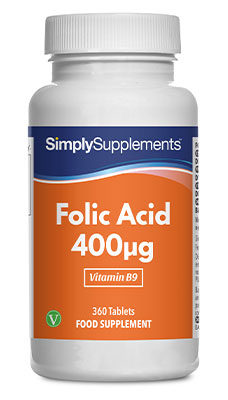Health Benefits of Folic Acid

Many people disregard folic acid if they aren’t trying to conceive, however, folic acid benefits everyone.
Men and women of all ages need to consume this vitamin on a daily basis to ensure the healthy production of new red blood cells, DNA and RNA. Read on to learn how much folic acid to take from different sources.
What Is Folic Acid?
Folic acid is the synthetic form of folate which is used in fortified foods and supplements, and the two terms are often used interchangeably. Both are essential for the production of healthy new cells throughout the body and the maintenance of the central nervous system.
They also play an important role in the development of the neural tube during pregnancy and reduce the risk of birth defects.
For this reason, prospective mothers are advised to take folic acid supplements to protect against birth defects of the brain and spine.
Folic Acid Benefits
Folic acid benefits health in several different ways and some of these benefits are just as important for men as they are for women. For this reason, everyone should ensure they receive adequate levels of folic acid in their diet. The key health benefits of folic acid include:
- Healthy Red Blood Cells: Folic acid is essential for the production of healthy red blood cells and the transportation of oxygen around the body. It also plays an important role in the body’s replication of DNA and RNA. A deficiency in folate may lead to anaemia, resulting in fatigue, weakness and an inability to concentrate.
- Foetal Growth During Pregnancy: Folic acid is perhaps best recognised for the important role it plays during pregnancy in the development of the foetal neural tube and reducing the risk of birth defects. More on this below.
- Normal Homocysteine Levels: Low levels of folic acid are closely linked to high homocysteine levels. Homocysteine is an amino acid, high levels of which are thought to affect the interior lining of the blood vessel walls supplying the heart and brain with blood. This causes them to narrow over time and increases the risk of atherosclerosis, heart attacks, stroke and memory loss. Folic acid has been found to reduce homocysteine levels by as much as 20% to 30% and is particularly effective when taken in combination with vitamin B12.
- Improved Memory: Folic acids ability to normalise homocysteine levels can also benefit memory. A growing body of evidence shows that B vitamins help to reduce the risk of age-related memory loss. Clinical trials combining folic acid, vitamins B6 and B12 have found beneficial reductions of the fatty plaque build-ups (homocysteine) in the brain which are known to accelerate the loss of brain cells, and are closely associated with memory loss and cognitive decline.
- Central Nervous System: Folic acid plays a central role in the development of the central nervous system, particularly during the early embryonic period. However, new evidence shows that supplementation can also enhance the growth, repair and recovery of the adult central nervous system. One reason for this is that folic acid protects the blood vessels that supply the central nervous system against oxidative damage.
Folic Acid in Pregnancy
The body requires a higher intake of folic acid during pregnancy due to the rapid cell replication and growth of foetal, placental and maternal tissue, including DNA and RNA synthesis. It stimulates the growth of these tissues in the embryo, which develop into the brain and spinal cord during the first few weeks of pregnancy. If the development of these tissues is impaired, it can significantly increase the risk of neural tube defects.
There is very strong evidence that folic acid taken prior to conception and during the first twelve weeks of pregnancy reduces the risk of neural tube defects, and remains beneficial during the second and third trimesters for cell growth.
Neural tube defects arise when the embryonic neural tube fails to close around the spinal cord within the first trimester of pregnancy, and also increase the risk of cardiovascular malformations, cleft palates, and low birth weight.
There is evidence that taking folic acid supplements for a whole year before conceiving reduces the risk of having a premature baby by about half.
What Are Neural Tube Defects?
During the early stages of pregnancy, the neural tube begins to close to form the brain, skull, spinal cord and backbone. A neural tube defect occurs when the tube doesn’t successfully close, leaving parts of the brain (anencephaly) or spine (spina bifida) exposed. Spina bifida occurs when the protective layer around the spine doesn’t close properly, leaving nerves exposed, which can lead to paralysis, incontinence and loss of skin sensation. Another neural birth defect is anencephaly, which prevents the development of the brain and skull, and affects thinking and coordination. Almost all babies with anencephaly will die shortly after birth.
In the UK, neural tube birth defects occur in about 1 in every 1000 pregnancies each year – that’s approximately 100 babies born with a neural tube defect every year. And the number is growing. Despite the fact that low levels of folic acid are a known risk factor for neural tube defects, a survey conducted in 2014 found that only one in three women in the UK planning pregnancy took a folic acid supplement.
Since the publication of these findings, there have been calls for mandatory folic acid fortification in flour in the UK – a programme that has already proven successful in over 70 countries, including America and Australia where it is believed to have reduced the occurrence of spina bifida by two thirds. These calls are currently being considered by UK health ministers.
Folic acid is recommended for all women of childbearing age because many are not aware of pregnancy during the early stage when folic acid is so important. If you weren’t taking a folic acid supplement before you found out you were pregnant, start taking one as soon as possible.
How Much Folic Acid to Take
Folic acid is water-soluble, which means it is not stored in the body and needs to be consumed daily. Adults and children over 11 years are advised to take 200mcg of folic acid on a daily basis. This nutrient reference value (NRV) is significantly higher at 400mcg for women who are considering pregnancy or are already pregnant. If there is a history of neural tube defects, your doctor may advise you take 500mcg per day.
Sources of Folic Acid
Increasing your awareness of the folate content of the foods you eat will help you to determine how much folic acid to take in supplement form. Be aware that some of the folate content can be lost during storing, processing or cooking, so to retain as much folate content as possible, steam or stir-fry vegetables rather than boil them. There doesn’t appear to be any danger of consuming too much folate through natural foods. Here are a few of the best food sources of folic acid:
- 1 cup - lentils – 350 mcg
- 1 cup - pinto beans – 294 mcg
- 1 cup - spinach – 260 mcg
- 1 cup - asparagus – 260 mcg
- 1 cup - collard greens – 177mcg
- 1 cup - beetroot – 136 mcg
- 1 cup - avocado – 90 mcg
- ¼ cup - sunflower seeds – 82 mcg
- 1 - orange – 40 mcg
- 1 cup - strawberries – 14 mcg
Cereals and flours are sometimes fortified with folic acid, although this is more common in countries outside the UK. Supplements offer a convenient means of ensuring you receive adequate levels of folic acid on a daily basis, and when they are taken within the recommended guidelines they are extremely safe. There is even evidence that the body can absorb synthetic sources of folic acid more efficiently than natural folate from foods. However, fortified foods and supplements may be harmful in high doses above 1000mcg per day.
Most people, excluding pregnant women, should be able to consume sufficient level of folic acid from diet alone. However, pregnant women are advised to take a daily folic acid 400mcg supplement to ensure they meet the body’s requirements.
One of the most effective ways to ensure your intake is sufficient is to take a daily multivitamin with folic acid, which is perfectly safe to take alongside dietary sources of folate. This can provide you with all the folic acid your body needs, particularly for women of reproductive age. Folic acid can be taken with or without food.
Folic Acid Deficiency
There are several reasons you may have a folic acid deficiency. A common cause is a poor or restricted diet in which the body does not receive sufficient levels of folate on a daily basis.
Certain prescription drugs can also block the body’s absorption of folate from foods, so check with your GP if you should be adding a supplement to your regime while taking medication.
Tobacco and alcohol also reduce the body’s ability to absorb and use folate. It may also be hereditary folate malabsorption, which is caused by mutations in the genes and affects gastrointestinal folate absorption.
Symptoms of a folic acid deficiency can be very subtle and may no show at all. When they do appear, symptoms can include:
- tiredness and fatigue
- irritability
- loss of appetite
- unexplained weight loss
Low levels of folate are closely associated with increased homocysteine levels in the blood, while a severe deficiency can result in megalobastic anaemia, which causes feelings of fatigue, weakness and shortness of breath.
Side Effects of Folic Acid
No adverse reactions or side effects of folic acid supplements have been reported when taken at the recommended dose. However, taking very high doses of 800 mcg to 1200 mcg daily over a long period of time may cause nausea, bloating or difficulty sleeping, and can disguise symptoms of a vitamin B12 deficiency.
To avoid any side effects of folic acid, you should only take mega high doses on the advice of your doctor. Also, take precautions when using prescription medications as these may inhibit some folic acid benefits, so speak to your GP prior to supplementation.

 Nicole
Nicole 

























